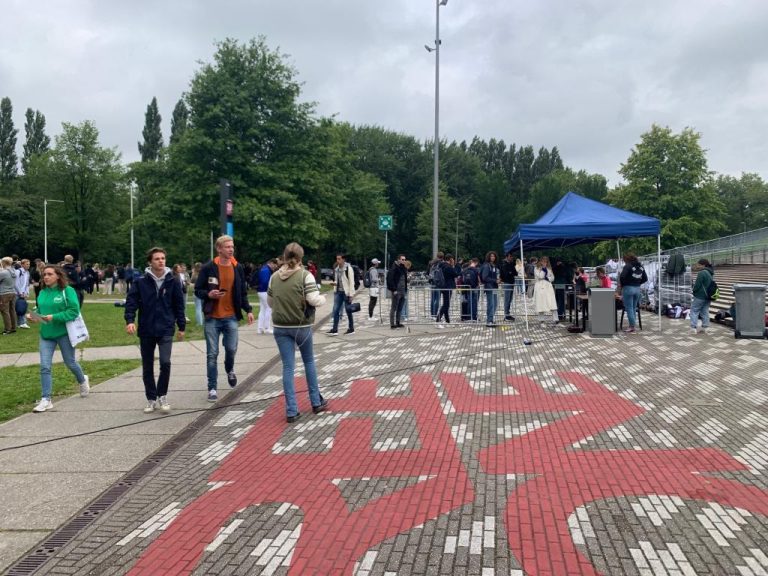The return of physical education at universities is a cause for joy, but also for concern. Lecturers and administrators wonder how safe it will be on campus.
Foto later toegevoegd. (Foto: Justyna Botor)
From 30 August, students will no longer have to observe social distancing, the Dutch Prime Minister Mark Rutte announced last Friday at the government’s latest press conference about the coronavirus pandemic. This is three weeks earlier than recommended by the experts.
But the brakes are not being released entirely. Face masks will still be mandatory in corridors and hallways, and no more than 75 students will be allowed to gather at the same time in lecture rooms. In addition, higher education institutions have to keep their buildings well ventilated and must have a variety of walking routes so as to avoid crowding. The cabinet also expects students to do a self-test twice a week and to stay home if they do not feel well. The hand sanitising stations will not be removed for the time being either.
Students are relieved
National interest groups – such as the Interstedelijk Studentenoverleg (ISO), the Landelijke Studentenvakbond (LSVB) and the Vereniging van Universiteiten (VSNU) – have reacted positively, although they would have preferred that the maximum group size did not apply. New freshmen at TU Delft are also happy. “I think it would be great to see fellow students in real life,” says prospective first-year Architecture student Mees (18) as she is about to start the OWee, the annual introduction week for students in Delft. “Seeing fellow students is more fun and I think it helps a lot to absorb the material. I don’t know if I would make it if I had to do everything digitally, just like the freshmen of last year.”
First-year Mechanical Engineering student Thomas (18) is also very happy. “Although I don’t know yet what the physical part of my study will look like.”


Duo to corona the OWee is divided between two ‘shifts’. Wednesday the second shift of participants started their OWee (Photo: Delta).
Is it risky to relax the rules?
Er kleeft een risico aan het toestaan van fysiek onderwijs, zeggen deskundigen en hoogleraren. In een uitzending van Op1 maakte viroloog Ab Osterhaus zich zorgen en ook elders klinkt scherpe kritiek. TU Delft professor of biotechnology Jack Pronk urges students on Twitter to get vaccinated.
The higher education sector will become a “fast track for the virus”, predicts UvA professor of Political Science John Grin in De Volkskrant. Philosopher Jeroen de Ridder of The Young Academy is also afraid that the virus could flare up again.
‘The experience of the premature relaxation at the end of June is still at the back of our mind’
Not all students are keen on the relaxations either. Of the 700 students on the opinion panel of current affairs programme EenVandaag, only half are in favour of the relaxations, while 39 percent consider the reopening a bad idea. Some young adults cannot get vaccinated, because of an auto-immune disease for example, and some of them are in a state of panic, reports Het Parool.
Cold feet, or…?
The critics feel that the OMT is on their side. Don’t introduce the relaxations until 20 September, was the advice of the experts. The OMT predicts clusters of infections “and consequent unrest” if the cabinet scraps the measures earlier
Students are returning from their holidays and could be bringing the virus back with them. Moreover, not everyone who wants to be fully vaccinated has had both jabs yet. The thought process therefore is that restrictions ought to remain in place at the start of the academic year. .
‘Dansen met Janssen’
That is what the Municipal Health Services (GGDs) feel as well. “The experience of the premature relaxation at the end of June (‘dansen met Janssen’) is still at the back of our mind”, says André Rouvoet, chairman of the umbrella organisation for the GGDs. Those relaxations led to an explosive increase in the number of infections.
Among 18 to 25-year-olds, 64 percent have had their first vaccination, according to the RIVM. Other figures show that more than 80 percent of 16 to 24-year-olds are willing to be vaccinated, and that percentage is increasing.
In Delft both Merel and Thomas have already been vaccinated. “It felt like the most safe option”, says Merel. “It also makes it easier for me to go to events like this. Without vaccination, you have to get tested every day if you really want to participate in the OWee.”
HOP Bas Belleman/ Delta
Do you have a question or comment about this article?
redactie@hogeronderwijspersbureau.nl

Comments are closed.